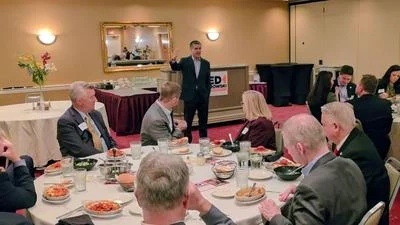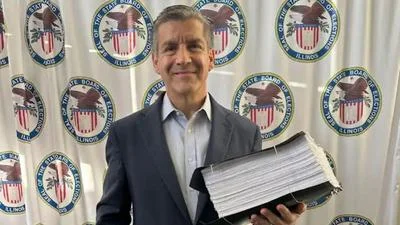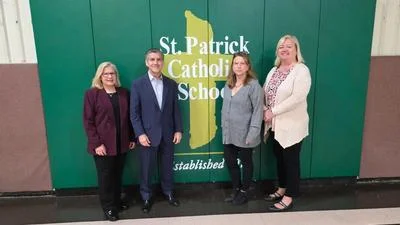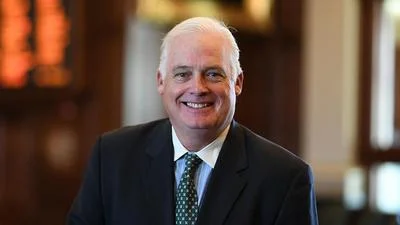Southern Illinois University Paul Simon Public Policy Institute Director David Yepsen | Photo courtesy of David Yepsen
Southern Illinois University Paul Simon Public Policy Institute Director David Yepsen | Photo courtesy of David Yepsen
There is no painless fix that will get Illinois out of its fiscal mess anytime soon, the retiring director of the Southern Illinois University Paul Simon Public Policy Institute said during a recent interview.
"It will be years before Illinois gets out of this fiscal mess," David Yepsen, who plans to retire at the end of October, said. "It took years to get into it. Even after policymakers settle on a state budget, there will be several years bringing the pension deficits into balance. There’s just no way around this: the state will have to cut spending and raise taxes to get out of this."
Yepsen said that should not discourage the state from getting to work on that long, painful process.
"What’s important is the state get on a path to fiscal health," he said. "People and businesses will feel better about living in and locating in Illinois if they can see we are on the mend."
Yepsen, SIU Paul Simon Public Policy Institute director since 2009, announced his retirement in an institute press release. Prior to becoming director of the institute, Yepsen was best known for his 34-year career as political writer, editor and columnist for the Des Moines Register.
As the institute’s director, Yepsen often has made observations about the state's political climate and challenges, including the drop in Illinois' population caused in part by economic conditions and "Moving Cities Forward" legislation.
“David has brought significant visibility to the institute through guest speakers, public policy polls and his role as a political commentator for national media,” Susan Ford, interim provost and vice chancellor for academic affairs at SIU, was quoted in the press release. “The institute and university have benefited from his expertise and leadership.”
Established by former U.S. Sen. Paul Simon in 1997, the institute offers initiatives and research related to public policy, ethical conduct in government and the promotion of responsible citizenship, according to the press release.
Yepsen's retirement comes just before the general election in November and as the state of Illinois faces some of the greatest challenges in its history, including the present fiscal crisis.
There is plenty of blame to go around about that, including a "'congenital failure' of leadership, along with voter unwillingness to appreciate the state’s financial issues and hold lawmakers accountable," according to a recent Institute report.
Regional differences have played important and significant parts in shaping Illinois current system, Yepsen said.
"Illinois is a big state with several different political cultures," he said. "Those differences make it hard to govern. The regions were settled by people from different parts of the world so you have urban/rural differences and racial divides. Southern Illinois does look a lot like the South: more conservative, less diverse than Chicago or the collar counties."
Those differing cultures have not always seen eye-to-eye, Yepsen said.
"These differences make it hard to reach agreement on issues," Yepsen said. "It makes people wary and suspicious of one another."
For example, he said that southern Illinoisans complain that Chicago "gets everything."
"In fact, because there are a lot more people and a lot more wealth in the Chicagoland area, that region actually ships tax revenues to the southern part of the state," he said. "Roads, prisons, pensions, K-12, community colleges, SIU, Medicaid."
He said that southern Illinois taxpayers couldn't afford all those things on their own, "but there are still animosities and jealousies."
"Some of that has been around since we became a country - urban rural divides, etc.," he said. "People in northern New York have similar feelings toward the city. The effect of it all is it makes this a very hard state to govern."
Though a noted observer of Illinois' political landscape, Yepsen declined to make any predictions for the state of Illinois in November general election.
Of the U.S. Senate race between incumbent Republican Sen. Mike Kirk and his challenger, Democrat U.S. Rep. Tammy Duckworth; and the presidential race: "No predictions," Yepsen said.
"It’s way too early to forecast the elections," he said. "In these early days of the general election campaign, we can say that Sen. Kirk faces a difficult re-election challenge from Congresswoman Tammy Duckworth. Hillary Clinton has an early lead in the polls for president against Donald Trump, but the presidential race is full of wild cards. Trump is a non-traditional candidate. Clinton is the first woman to capture a major party nomination. Both have high negative ratings."






 Alerts Sign-up
Alerts Sign-up